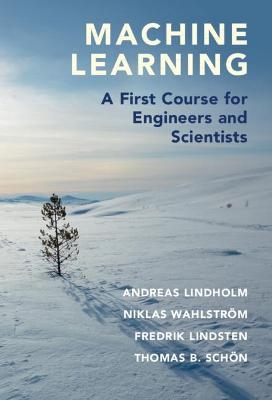
Machine Learning
Cambridge University Press (Verlag)
978-1-108-84360-7 (ISBN)
This book introduces machine learning for readers with some background in basic linear algebra, statistics, probability, and programming. In a coherent statistical framework it covers a selection of supervised machine learning methods, from the most fundamental (k-NN, decision trees, linear and logistic regression) to more advanced methods (deep neural networks, support vector machines, Gaussian processes, random forests and boosting), plus commonly-used unsupervised methods (generative modeling, k-means, PCA, autoencoders and generative adversarial networks). Careful explanations and pseudo-code are presented for all methods. The authors maintain a focus on the fundamentals by drawing connections between methods and discussing general concepts such as loss functions, maximum likelihood, the bias-variance decomposition, ensemble averaging, kernels and the Bayesian approach along with generally useful tools such as regularization, cross validation, evaluation metrics and optimization methods. The final chapters offer practical advice for solving real-world supervised machine learning problems and on ethical aspects of modern machine learning.
Andreas Lindholm is a machine learning research engineer at Annotell, Gothenburg, working with data annotation and data quality questions for autonomous driving. He received his MSc degree in 2013 from Linköping University (including studies at ETH Zürich and UC Santa Barbara). He received his PhD degree in 2018 from the Department of Information Technology, Uppsala University. At the time of writing this book he was a postdoctoral researcher at the same department. Throughout his entire academic career he has had a particular interest in teaching applied mathematical subjects. Niklas Wahlström is an Assistant Professor at the Division of Systems and Control, Department of Information Technology, Uppsala University. He received his MSc degree in 2010 and his PhD degree in automatic control in 2015, both from Linköping University, Sweden. During his studies he held a visiting position at ETH Zürich and Imperial College, London. Since 2016, he has been working at Uppsala University, first as a postdoctoral researcher and since 2019 in his present position. During his career, he has been involved in several machine learning course development projects. Fredrik Lindsten is Associate Professor at the Division of Statistics and Machine Learning, Department of Computer and Information Science, Linköping University. He received his PhD in Automatic Control in 2013 from Linköping University. In 2014-2015 he was a Postdoctoral Research Associate at the University of Cambridge. He has held visiting positions at the Statistical Artificial Intelligence Lab, UC Berkeley, and the Department of Statistics, University of Oxford. He has received the Ingvar Carlsson Award by the Swedish Foundation for Strategic Research, and the Benzelius Award by the Royal Society of Sciences in Uppsala. Thomas B. Schön is Beijer Professor of Artificial Intelligence, Department of Information Technology, Uppsala University. He has held visiting positions with the University of Cambridge, the University of Newcastle and Universidad Técnica Federico Santa María in Valparaiso. In 2018, he was elected to The Royal Swedish Academy of Engineering Sciences and The Royal Society of Sciences at Uppsala. He has been awarded the Tage Erlander prize for natural sciences and technology and the Arnberg prize by the Royal Swedish Academy of Sciences. He received the best teacher award at the Institute of Technology, Linköping University in 2009. He is a fellow of the ELLIS society.
1. Introduction; 2. Supervised learning: a first approach; 3. Basic parametric models and a statistical perspective on learning; 4. Understanding, evaluating and improving the performance; 5. Learning parametric models; 6. Neural networks and deep learning; 7. Ensemble methods: Bagging and boosting; 8. Nonlinear input transformations and kernels; 9. The Bayesian approach and Gaussian processes; 10. Generative models and learning from unlabeled data; 11. User aspects of machine learning; 12. Ethics in machine learning.
| Erscheinungsdatum | 01.04.2022 |
|---|---|
| Zusatzinfo | Worked examples or Exercises |
| Verlagsort | Cambridge |
| Sprache | englisch |
| Maße | 182 x 259 mm |
| Gewicht | 880 g |
| Themenwelt | Informatik ► Theorie / Studium ► Künstliche Intelligenz / Robotik |
| ISBN-10 | 1-108-84360-3 / 1108843603 |
| ISBN-13 | 978-1-108-84360-7 / 9781108843607 |
| Zustand | Neuware |
| Haben Sie eine Frage zum Produkt? |
aus dem Bereich


